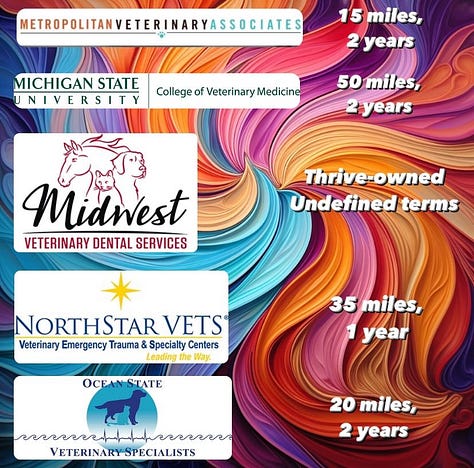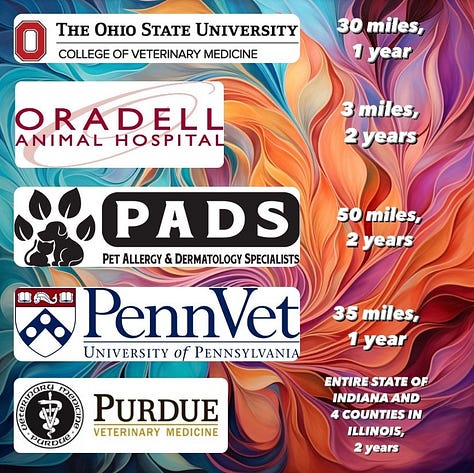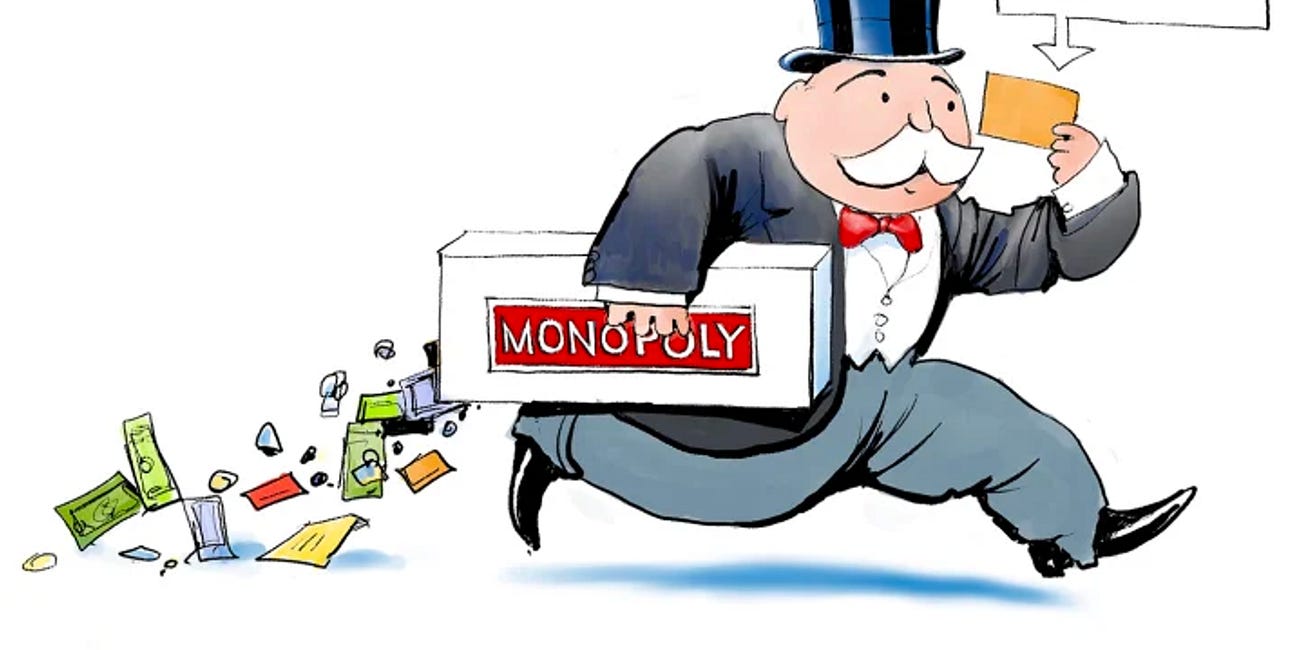It's Time to End Anti-Competitive Bullsh*t in Vet Med
What does the FTC ban on non-competes really mean in practice?
[Verse]
The piece of paper you have says that you
Can get into my pocket
But you can't get inside my heart or inside my head
Money doesn't mean to me what it obviously means to you
Cause I would never steal from kids that don't have a clue
[Chorus]
You don't own me
They've abolished slavery
And I can't wait for the day when things
Turn around
You don't own me
They've abolished slavery
There's consequences for your actions
I know cause I'm paying for mine now
— MxPx, “What’s Mine is Yours”
A number of friends sent me the big news yesterday: The Federal Trade Commission (FTC) ruled that non-compete agreements are illegal!
The Federal Trade Commission (FTC) voted 3-2 on Tuesday to ban noncompete agreements that prevent tens of millions of employees from working for competitors or starting a competing business after they leave a job.
From fast food workers to CEOs, the FTC estimates 18 percent of the U.S. workforce is covered by noncompete agreements — about 30 million people.1
The final rule would ban new noncompete agreements for all workers and require companies to let current and past employees know they won’t enforce them. Companies will also have to throw out existing noncompete agreements for most employees, although in a change from the original proposal, the agreements may remain in effect for senior executives.
On some level, this is great news we should all celebrate. But the reality on the ground is much more complicated, as we’ll get to later…
Why would so many people forward those articles to me? As friends and long time readers know, my career has essentially been de-railed by restrictive legal covenants, necessitating I travel out of state for contract teaching work and scrounging for low-key consulting opportunities that I have to keep under the radar to avoid lawsuits (this is not hypothetical, I know friends who have been sued!)
It has severely damaged my job prospects; I have been applying for positions since 2021, and despite a strong resume and excellent recommendations, no one will hire me.
I wrote about this predicament last summer, though my readership at the time was much smaller, and I kept the essay behind a paywall to limit the distribution out of fear of retribution and harassment. However, in light of some of the things I’ve seen over the past year, I decided to repost it and remove the paywall:
Who's Afraid of A Little Competition?
I have had to sign non-compete agreements for multiple previous employers, and as a result, my options for working as a pathologist in the private sector are severely restricted. What exactly are the provisions in question? As you’d imagine, I am not able to discuss the specifics of my situation due to my non-disclosure agreements and would never knowingly share confidential information. However, what I can do is share some excerpts from public record legal documents about recent employment lawsuits in the veterinary diagnostic sector.
A Tenuous Victory
So why am I lukewarm on this win from the FTC? There are several reasons.
First, this is all but certain to be litigated in the courts, delaying any relief for workers for years. The U.S Chamber of Commerce and other business groups have promised to sue the FTC to block this rule:
Chamber President and CEO Suzanne Clark called the FTC vote to ban noncompetes “a blatant power grab that will undermine American businesses’ ability to remain competitive.”
“This decision sets a dangerous precedent for government micromanagement of business and can harm employers, workers, and our economy,” Clark said. “The Chamber will sue the FTC to block this unnecessary and unlawful rule and put other agencies on notice that such overreach will not go unchecked.”
Second, even if this ruling survives legal challenges, the problem with making policy by regulatory agency discretion is that it can be overturned instantly by a future administration that is opposed to the rule change. If President Trump were to win in 2024—or frankly any Republican president in the future—this protection will surely be shelved.
Third, as described in my article above, companies have gotten really creative about finding work-arounds for states where non-competes are already not enforceable, such as California, Colorado, Maine, and others. There are myriad legal tactics that are not literally “non-compete” agreements yet still prevent employee mobility and have the same end effect. These can range from more defensible provisions like non-solicit clauses (I’m not arguing employers don’t have the right to prevent former employees from explicitly luring away clientele) to more extreme strategies like no-service agreements, “liquidated damages” provisions2, and weaponizing trade secret and non-disclosure agreements.
I have seen some organizations tell prospective employees that they got rid of non-competes, and while it was true in the literal sense that those words don’t appear in the contract, they contained different language that was essentially the same. Not cool! That would essentially be like telling someone “Don’t worry, we outlawed the death penalty by lethal injection in this state,” without mentioning you’ve gone back to the firing squad 💀
Finally, for my own personal situation, I would likely be included within the exemption for “senior executives” which the FTC defines as employees in a “policy-making position” that earn a salary typical of an average vet.
So while I am happy to see this victory, it represents only the beginning of a multi-year fight, not the end, and any durable long-term solution is going to be up to stakeholders in the veterinary profession.
A Widespread Problem in Vet Med
This issue is not isolated to pathologists working in diagnostic labs. I know multiple ER vets, internists, neurologists, and surgeons who had non-competes that boxed them out of work so far they also had to travel out of state, sometimes thousands of miles. I won’t provide identifying details to protect their privacy and avoid any legal issues, but it should not be hard to imagine this put a large strain on their families and finances.
I also want to take a moment and state clearly that this is not simply an issue with corporate-owned hospitals and labs. Many prominent veterinary influencers online that have come out for #endtheveterinarynoncompete use it to grind their personal axes about corporations/venture capital/private equity, or exploit the issue to promote their own companies. As the infographics below show, there are many independent for-profit clinics and even, unbelievably, university teaching hospitals that enforce aggressive non-competes. (It is particularly galling to see this anti-competitive behavior from non-profit institutions that are subsidized by tax payers 🤬). As in human medicine, there is an automated matching system for post-DVM training programs, so if you applied to any program that has a non-compete or similar clause, you will be locked into these contracts if the computer sends you there, and if you withdraw from the program you are black-balled from the system for 3 years.






To pick on one of these in particular, Purdue University prevents its residents who finish from working anywhere in the state of Indiana as well as four Illinois counties in the Chicago metro area for two years. Even if you are sympathetic to the staffing shortages faced by vet schools, the distance between Purdue and Indianapolis is over an hour drive (roughly 70 miles), while the distance between Purdue and Chicago is almost 200 miles and just under a THREE hour drive! That is simply not a remotely reasonable geographic restriction.
Trapping veterinarians who carry hundreds of thousands of dollars in student loan debt in jobs they want to leave under threat of costly lawsuits is uncomfortably close to a modern form of indentured servitude. It kills morale, contributes to the mental health crisis in this profession, limits consumer choices, and exacerbates shortages of ER vets and specialists.
Proponents of these restrictive legal provisions argue they are necessary to protect their caseload, intellectual property, and investment in trainees. Pardon me if I call BS on those claims!
There are a number of thriving veterinary hospitals and labs that do NOT use these tactics under any circumstance
Many national companies that DO use them still employ veterinarians, technicians, and other staff in states where NCs are illegal, yet they somehow manage to stay in business
The American Medical Association (AMA) opposes non-competitive agreements on grounds that it hurts continuity of care for patients
Believe it or not, but the legal profession actually does not allow lawyers to bar other lawyers from work via these tools. (PS—No offense to my friends with JDs, but when you are losing a battle of ethics to lawyers, you should seriously rethink your position!)
The heart of the tech sector—Silicon Valley—is in California, where not only are NCs illegal, but there are many other pro-worker laws on the books. Guess what? Five of the top 10 largest public US companies by market cap are headquartered in CA3, and they are reaping record revenues and profits. Despite aggressively competing for talent and trying to protect their own technology, they don’t seem to lose sleep over IP that is much more valuable that the client list at a local clinic.
On Competition
I find it highly ironic that the president of the U.S. Chamber of Commerce claims the narrow FTC ruling is “a blatant power grab that will undermine American businesses’ ability to remain competitive.”
The Merriam-Webster dictionary defines competition as “the effort of two or more parties acting independently to secure the business of a third party by offering the most favorable terms.” Employing legal chicanery to artificially manipulate the labor market and protect one’s own interests is actually textbook anti-competitive behavior.
Competition is the lifeblood of capitalism. It is good for pet owners to have many different clinics and doctors to choose from. Multiple companies fighting over market share drives innovation and moderates prices. Vets and techs and scientists and managers switching between companies can even benefit those organizations through diffusion of ideas. Everyone wins when businesses have to fight to keep their staff and customers satisfied. In contrast, monopolization and restrictive covenants create sclerosis, dissatisfaction, and out of control costs.
To wit: If your business requires coercive legal traps to retain your clients and employees, your organization sounds like it is has deeper problems that need to be addressed. Aren’t these same “pro-business” lobbying groups always saying we need to “let the market sort it out,” with inefficient and poorly-run businesses failing? Perhaps we should take them at their word and do just that 🤔
At the risk of sounding hopelessly naive, I don’t think employing anti-competitive behavior to protect a practice’s bottom line is very collegial behavior or in the long-term best interest of animals and society. Or perhaps I just take seriously the Veterinarian’s Oath that I swore when admitted to this profession:
Being admitted to the profession of veterinary medicine, I solemnly swear to use my scientific knowledge and skills for the benefit of society through the protection of animal health and welfare, the prevention and relief of animal suffering, the conservation of animal resources, the promotion of public health, and the advancement of medical knowledge.
I will practice my profession conscientiously, with dignity, and in keeping with the principles of veterinary medical ethics.
I accept as a lifelong obligation the continual improvement of my professional knowledge and competence.
It is far past time to shelve these draconian legal restrictions that hurt veterinarians, pet owners, and ultimately, animals. The veterinary industry should come together to end these practices once and for all.
The proportion of employees covered by non-competes is far higher in veterinary medicine than the general US population, and often includes techs/nurses and lower paid assistant staff. According to the veterinarian and employment lawyer Lance Roasa, DVM, JD: “And so now at this point, nearly 99.9% of the practice of the contracts that I see contain a non-compete, especially from a state that will enforce a non-compete.” While his perspective is likely skewed by being a lawyer with expertise in this specific area, the bottom line is they are very common. (Source: podcast episode at https://drandyroark.com/non-competes-going-away/)
These fun little clauses use financial penalties rather than the traditional non-compete remedy of an injunction to prevent working elsewhere. People in vet med have been slapped with punishments ranging from tens of thousands to HUNDREDS of thousands of dollars.
Those companies are Microsoft (#1), Apple (#2), NVIDIA (#3), Alphabet/Google (#4), and Meta (#6)







This whole essay got lost in my mail but I'm glad it was in my archive. Magnificently written. I could not agree with you more. Noncompete contracts and this who force employees to submit to private arbitration are blatant attempts to "legally" reduce people to chattel slavery. I won't mention names, but one of our two major parties has been would-be enslavers for generations. That shameful impulse seems to be in their very DNA now. Thank you for this important piece.